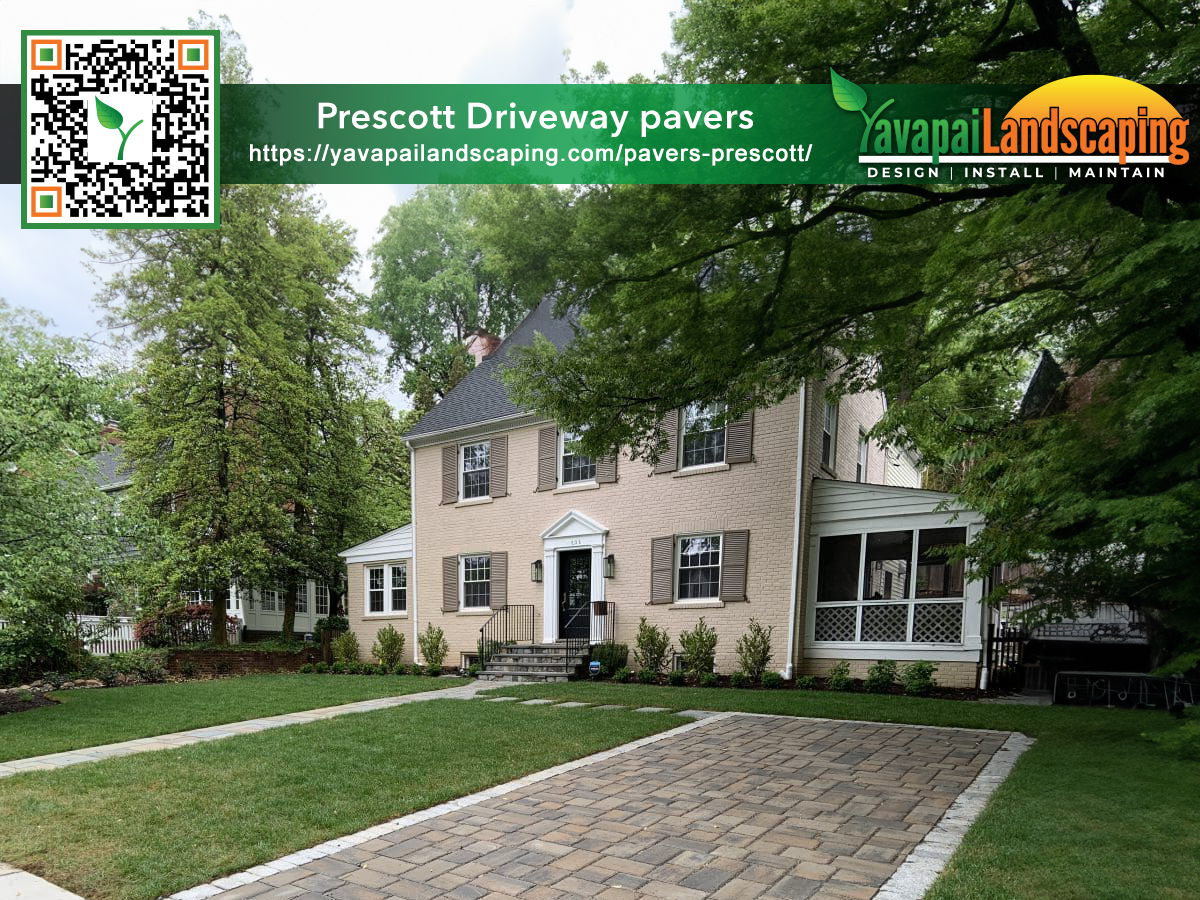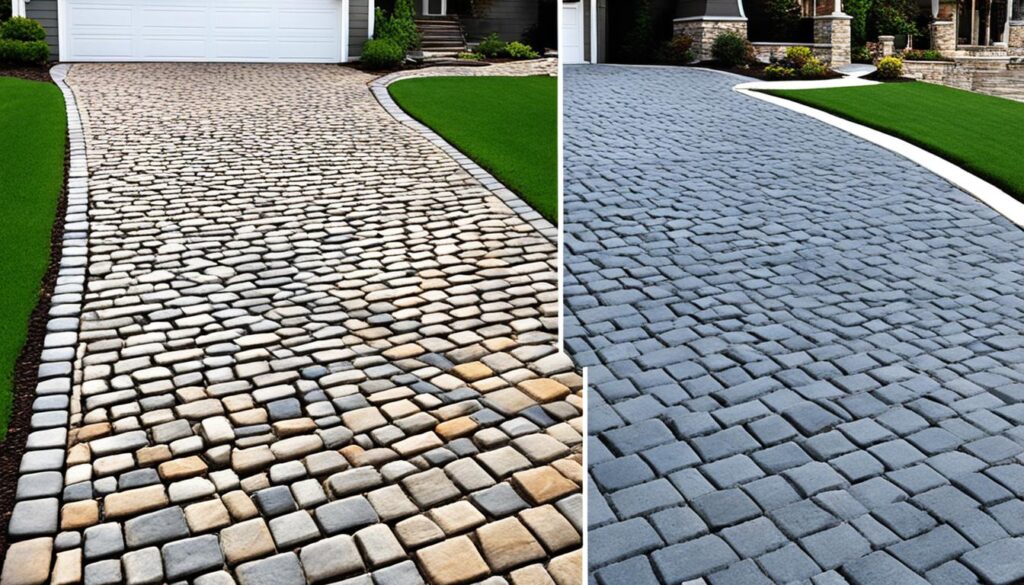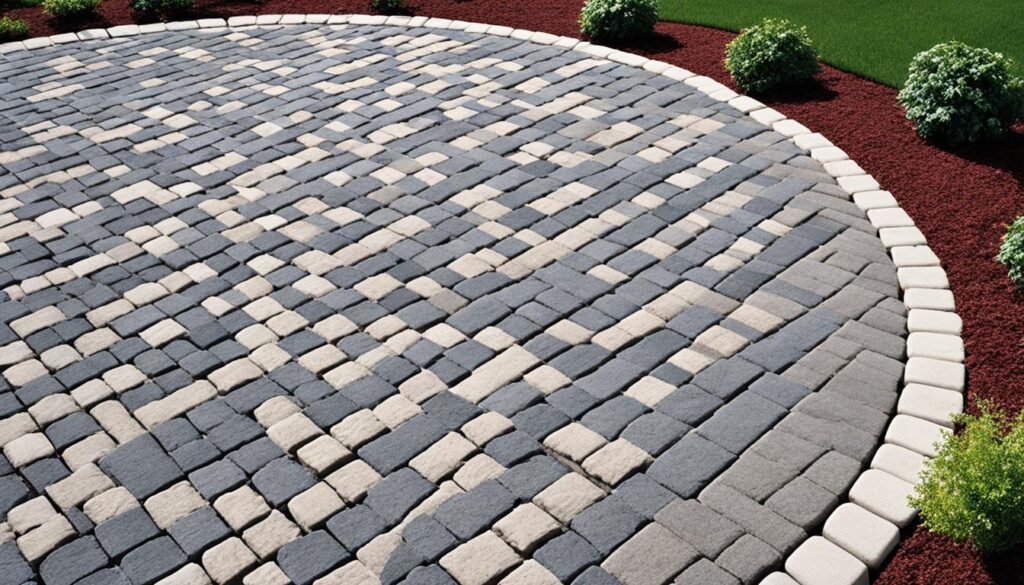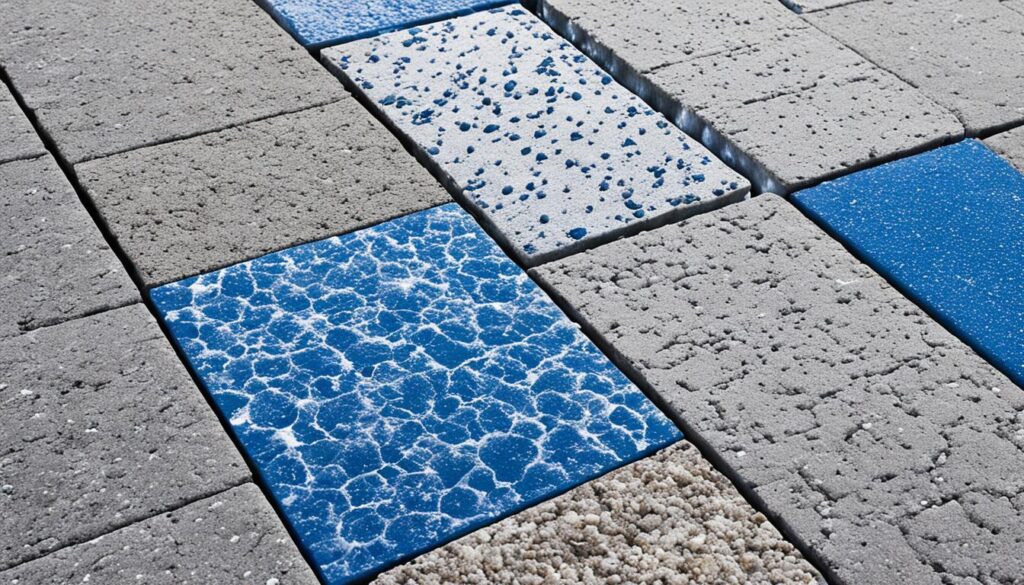
Choosing the right materials for your driveway makes a big difference. Homeowners often debate driveway pavers versus concrete. Each choice offers benefits, and knowing these can help you pick the best option for your home.
Driveway pavers and concrete both improve the appearance of your home. However, they offer different benefits, such as durability and cost. When planning your projects, consider what you need and like.
Key Takeaways
- Driveway pavers and concrete are top choices for hardscape projects
- Both materials offer unique advantages in durability and aesthetics
- Cost considerations vary between initial installation and long-term maintenance
- Climate and usage patterns impact material performance
- Proper installation is crucial for the longevity of both pavers and concrete

Introduction to Driveway Materials: Pavers and Concrete
Homeowners often choose between pavers and concrete for their driveways. Both have pros and cons. It’s important to pick the one that fits your needs.
Definition of driveway pavers
Driveway pavers are like puzzle pieces. They are made of concrete, brick, or stone. These pieces fit together tightly to make a strong surface for cars. Some also let water through so they can help with rainwater.
Overview of concrete driveways
A concrete driveway is made in one big piece. It’s strong and needs little care. With stamps, you can even make it look like something else, like pavers or stone. This keeps its toughness but adds style.
Importance of choosing the right material
Choosing the right driveway type is key. It affects how your home looks, how much you care for your driveway, and its value over time. Your climate, soil, and what you like are all important. Consider whether you want something with many designs (pavers) or something simpler but very strong (concrete). Let this article be your guide to deeper insights.
Aesthetic Appeal: Comparing Pavers and Concrete
Pavers allow you to design your driveway in unique ways. They offer a wide range of shapes and styles, making it easy to create a beautiful look for your home.
Design Versatility of Pavers
When it comes to options, pavers shine. You can choose from many shapes and sizes. They make it simple to mix designs, like herringbone or basketweave, for a standout look.

Color and Pattern Options
Pavers come in many colors, from earthy to vibrant. This lets you match your driveway to your home’s theme. Unlike concrete, pavers offer more diverse and rich color choices.
Curb Appeal and Property Value
A beautiful paver driveway adds to your home’s charm and can even raise its value. Houses with custom driveways often sell quickly and for more money.
- Pavers offer endless design possibilities.
- Color options range from subtle to bold
- Custom patterns create unique looks
- Enhanced curb appeal can increase home value
Choosing pavers allows you to personalize your space, making it a smart choice for people who want their homes to look their best.
Durability and Longevity: Which Material Lasts Longer?
When choosing between pavers and concrete for your driveway, consider durability. Each has features that aid in good performance against weather and over time.

Concrete driveways are praised for their hard build. They can carry heavy loads and handle much use. Yet, they tend to crack in cold or hot weather. You must look for cracks and fix them promptly to avoid bigger problems.
Now, pavers do well because they lock together. They can move a bit when it’s hot or cold, cutting down on visible cracks. This can be a great benefit in places with lots of weather changes.
Let’s look closer at what makes each option durable:
- Weather Resistance: Pavers often win vs. concrete in rough climates
- Freeze-Thaw Cycles: Pavers are better at dealing with size changes
- Crack Prevention: Their design helps them stay looking good
- Repairs: It’s easier to swap out single pavers than fix whole concrete areas
Concrete gives a strong but inflexible driveway, while pavers show their adaptability. This means pavers can look better for longer in changing weather areas. Homeowners facing many weather challenges might find pavers a wise investment for their driveway’s endurance. Take a journey of learning with this captivating read.
Cost Analysis: Initial Investment and Long-Term Value
Choosing pavers or concrete for your driveway means considering immediate and future costs. This guide will help you understand the financial aspects of each option and assist you in making a smart choice.
Upfront costs of pavers and concrete
Installation costs differ based on your choice. Concrete driveways are cheaper to install at first. This is because it’s easy to pour and shape concrete. Pavers, although more expensive, let you customize your driveway. This can make your home more attractive.
Long-term maintenance expenses
It is important to consider maintenance costs. Concrete needs less care often, yet fixing cracks in concrete can be expensive. Pavers are easier to replace piecemeal, which might reduce the cost of upkeep over the years.
Return on investment considerations
A beautiful driveway can raise your home’s value. Paver driveways are often worth more because of their beauty and strength. Concrete driveways add value, but pavers can make your home stand out.
Yavapai Landscaping Prescott offers no-cost estimates for its landscaping and tree services in Prescott and the neighboring regions. These include tree elimination, pruning, stump grinding, land clearance, storm clean-up, and emergency tree care.
